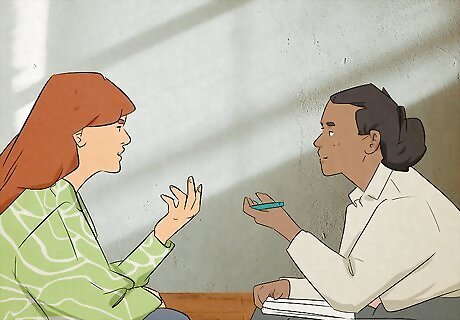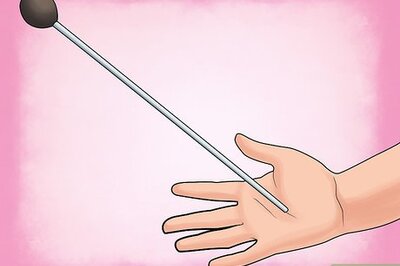
views
- Focus on the present and accept the past as a lesson. Stop wasting time thinking about how you’ve wasted time!
- Practice gratitude for the good things that are in your life. Reflect on the time you feel you’ve wasted and consider the positive things that have come out of that time.
- To accept your past and move forward, get out of your comfort zone by trying a new hobby, taking a class, or making a career change.
Why You Feel Like You’ve Wasted Time

You’re afraid to follow your dreams. You may have had a passion all your life but been fearful of pursuing it due to self-doubt or a lack of self-esteem. Many people with creative aspirations—like filmmaking, acting, singing, writing, etc— are discouraged from these fields because they’re not considered to be “real” or practical careers. You’re not alone; putting yourself out there and taking a risk is scary. Many people enter into more financially stable or accessible careers because they’re afraid to take a chance on themselves. But if you don’t spend your time doing things that are meaningful to you and true to who you are, it’s easy to feel regret or loss later in life. That doesn’t mean your dream or passion must factor into your career—you could incorporate it as a hobby, side hustle, or volunteer position.

You’re not sure what you want to do with your life. Rather than having a dream you’re scared to go after, you may not know what your dream is in the first place. Truthfully, most people don’t have a solid idea of what they want to do with their life, even well into adulthood. And even if they do, that idea will likely change and evolve over their lifetime. If you’re feeling lost or uncertain about your life path, remember that you’re not wasting time because you don’t feel a sense of purpose. You’re in the process of discovering it, which is an equally valuable use of your time. There’s no set time frame for doing anything in life, and everyone operates on their own timeline. Try not to compare yourself to others and where they are in their life or career. Trust your intuition. Do things you care about and that feel good to you, not things you think you “should” be doing.

You feel like you’re stuck in a cycle. It’s easy to get stuck in a negative mindset and ruminate on how you got to this place: you feel like you’ve wasted so much time → you feel bad about yourself and your life → you lose the motivation and self-confidence to try new things → you waste more time thinking about all the time you’ve wasted, and the cycle repeats. It’s human nature to ruminate on things and get in your own head, so don’t be too hard on yourself. Help yourself out of this cycle with positive self-talk. Instead of thinking negative thoughts like “I can’t” or “Nothing will ever change,” say “I can try” or “I can try to change things.” Set a small daily goal to show yourself you can make positive changes. It could be in any area of your life, but make it achievable: e.g. drink 1 liter of water per day, call a different friend each day, or read 5 pages of a book before bed. These small, achievable goals serve to show you what you are capable of and pave the way for bigger goals when you’re ready.
How to Stop Feeling Like You’ve Wasted Time

Make a mental or physical list of all the positives in your life. Consider all the great things you’ve done or experienced. These positive things might seem minor, but they all make up who you are and the path you’ve been on so far. A close friend you’ve supported in some way. A pet you’ve taken in and given a home to. A successful project at work or a comment from an employer that made you feel valued. The last film, song, play, or art piece that resonated with you. The last delicious meal (or even guilty pleasure snack) that you ate or prepared. Start a gratitude journal with lists of all the things that you have done or experienced in your life that you’re thankful for. Refer back to this journal when you’re thinking negatively about your life. When you’re deep in a cycle of negative thinking, it’s easy to forget about everything you have to be grateful for. Ask yourself if you’ve really wasted your entire life—the answer is probably no!

Remember that you are responsible for making the changes you need. Confront what you’re feeling: that you’ve wasted time, that you’re not good enough, that you may fail, that you could be further along if you started earlier. That’s all okay. You can only start from where you are now, and you are the one who has to push yourself toward what you want. Making big life changes can be stressful and overwhelming. It may feel easier to stay where you’re at (and in your comfort zone!), but it’ll hurt you more in the long run.

Focus on the present. If you feel like you’ve wasted 10 years of your life, that’s a difficult feeling. But what’s worse is continuing to waste 10 more years of your life. If you stay on the path you’re on now, you might look back in the future and wish you had made changes earlier. Focus on the changes and opportunities that are available to you now—there’s no time like the present!

View everything as a learning process. Focus on what you’ve learned from the years you think you spent wasting time. Maybe you’ve learned that you regret wasting time, that wasting time makes you feel bad, or you realized that you would have rather done something else with that time. Consider what you wish you had done during that time instead, which may point you in a direction to move toward. Reframing your so-called wasted time as a lesson or learning experience can make it feel more positive and help you move on. It’s okay to have regrets about previous choices, but learning from them and moving past them is the only way to avoid more regret.
How to Move Forward & Stop Wasting Time

Accept and take responsibility for your past. Allow yourself to “process what has happened in the past [and] let the experience fully complete or resolve,” advises life coach Guy Reichard. Complete acceptance of the past may be easier said than done because, as Reichard goes on to say, “it will involve experiencing difficult emotions.” However, taking responsibility for what’s happened in the past is essential in moving forward. Don’t let yourself be limited by the choices you’ve made in the past. Acknowledge why you felt stuck or didn’t follow your passions—maybe you had to work several jobs, were stuck in a toxic relationship, or had low self-esteem. There’s nothing wrong with these excuses or reasons, but moving forward and no longer wasting time means accepting and leaving them in the past. Speed up this process by intentionally reflecting on your life, meditating, or talking through your feelings with a therapist.

Avoid ruminating on your feelings. Remove yourself from the negative cycle of feeling like you’re wasting time, then spiraling because you feel bad about yourself and wasting even more time. Executive life coach Guy Reichard recommends “taking a step back from the incessant thinking (dwelling or ruminating) and learning to watch the thinker.” Instead of engaging with our negative thoughts and letting them control us, Reichard continues, “notice them and their associated feelings and let them run their course.” Reichard specifies that this is a skill that won’t happen overnight, although it can be developed through practicing mindfulness.

Explore your life purpose. There are different definitions of “life purpose,” so it’s up to you to find your own personal sense of purpose. Start by practicing gratitude, exploring your passions and interests, joining a community cause, practicing self-care, or working with a life coach. In his practice as a life coach, Guy Reichard encourages his clients to “discover [their] true selves...by stripping away all that is not who [they] really are, to reveal and experience [their] true essence. This gives meaning and purpose to life itself.” Following Reichard’s advice, your true self will then help you decide “how [you] wish to live and make [your] life meaningful.”

Define your personal values. Personal growth expert Guy Reichard helps clients find “what they truly care about by exploring and reflecting on the way they live and experience their lives. [They] explore scenarios like peak moments, gratifying experiences, hurtful experiences, ideal days, etc.” Use an assessment or instrument to define your personal values, just like Reichard uses with his clients. Try Barrett’s Personal Values Assessment, Taylor’s Core Values Index, or Mark Schall’s Core Values Index. Write a vision statement with your newfound personal values. Then, if you lose your way, you “will find [your] path of purpose again with greater ease…it can feel like a compass or beacon guiding you in the optimal direction,” maintains Reichard.

Set meaningful goals. Set goals based on your values and needs, rather than achievement-based goals that you think will make you happy once you’ve achieved them. According to life coach Guy Reichard, achievement-based goals often don’t grant long-term satisfaction. If you choose a values-based goal, however, it “facilitates you being more of who you truly are, and lets you work toward something you find meaningful [and] succeed no matter what.” Decide on a specific goal (big or small!) that you want to work toward. Write it down and tell someone you know about your goal. Break your goal down into small chunks and plan your first step. If your goal is to become a runner, for example, make a preliminary goal of being able to run down your block and back without stopping. Set daily intentions to honor your values and goals. Create a list of values or a values board and place it somewhere where you’ll see it regularly. This way, advises Reichard, you can “keep yourself aligned and check in on a regular basis.”

Improve your self-confidence. Feeling like you’ve wasted time in life can cause and be caused by self-doubt, pessimism, and low self-esteem. Pursuing your dreams and finding your life’s purposes requires trust and faith in yourself. Executive life coach Guy Reichard recommends the VIA Character Strengths Survey as a starter tool for self-confidence. The survey will identify your strengths, helping you “increase awareness of what you really care about and what virtues or values you could be paying more attention to, instead of your weaknesses.” Further boost your self-esteem by building a support network, setting and achieving small goals for yourself, challenging unkind thoughts about yourself, or getting counseling.

Get involved in new passions and interests. Stop wasting time now, and don’t put off your new habits and lifestyle changes any longer. Create momentum and keep it by investing time in new hobbies, interests, or even a career change. Spend time with people who inspire you by attending lectures, joining book groups, or finding other organizations in your area that align with your interests. When the opportunity arises to do something meaningful to you, don’t let it pass you by. Find a space for it, even if it means reducing time spent on other activities and responsibilities.


















Comments
0 comment